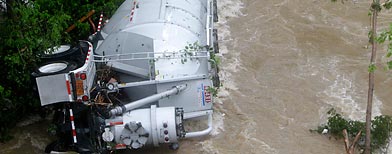NASHVILLE, Tenn. – About 1,500 guests of a downtown hotel complex spent the night in a high school to escape the flooding Cumberland River, which was expected to crest Monday following weekend thunderstorms that killed at least 19 people in Tennessee, Mississippi and Kentucky.
Officials in Tennessee were preparing for more deaths and for the Cumberland River, which winds through the Music City, to crest more than 11 feet, putting portions of downtown in danger of the kind of damage experienced by thousands of residents whose homes were swamped by flash floods.
The Cumberland River had already reached record levels since an early 1960s flood control project was put in place. With so much water inundating the Cumberland's tributaries, however, it was difficult to gauge whether the river would stop at 50 feet or exceed the forecast, increasing the water's spread in the city.
Authorities weren't taking any chances. They evacuated the downtown area and north Nashville where a leaky levee threatened residents and businesses. Flooding could hit the downtown tourism industry, a commuter train depot and the nearby LP Field, where the Tennessee Titans play.
Floodwater spilled onto a couple of downtown streets near the riverfront and restaurants and bars in the tourist district were closed.
At the Opryland Hotel, Monday morning brought sunshine and a view of flooded parking lots around the hotel and adjacent venues. Water surrounded the Grand Ole Opry House and the Opry Mills shoppingmall.
Mayor Karl dean called on Nashville residents Monday to use water only for cooking and drinking because one of the city's two water treatment plants was flooded.
Forecasters were on the money when they warned residents there would be severe weather across the Mid-South, but few could have predicted the devastation the relentless line of storms brought.
Tennessee Gov. Phil Bredesen called it an "unprecedented rain event," but that failed to capture the magnitude. More than 13 inches of rain fell in Nashville over two days, nearly doubling the previous record of 6.68 inches that fell in the wake of Hurricane Fredrick in 1979.
"That is an astonishing amount of rain in a 24- or 36-hour period," Bredesen said Sunday.
At least 11 were dead in Tennessee, six in Mississippi and two in Kentucky.
Tennessee Emergency Management Agency officials say there was likely an additional victim, but a body had not been recovered. Three people in Mississippi were killed when high winds believed to be tornados hit their homes and three others were killed in what authorities said were weather-related traffic accidents.
Kentucky Emergency Management officials said two deaths in Barren and Madison counties in central Kentucky were weather-related.
The weekend deaths came on the heels of a tornado in Arkansas that killed a woman and injured about two dozen people Friday. And just a week ago, 10 people were killed by a tornado from a separate storm in western Mississippi.
Bredesen said officials hoped for the best, but knew there might be more deaths reported Monday as authorities got their first real look at the damage after a weekend filled with frantic rescues.
"This is going to go on for a while," Bredesen said. "It's going to take a while for the water to recede and us to get down into this. It's going to take several days for this to get back to anything near normal."
Much of the damage from flooding was done in outlying areas of Nashville and across the middle and western parts of Tennessee. Rescues turned dramatic with homeowners plucked off roofs and pregnant women airlifted off a waterlogged interstate.
The rain ended Monday but there will likely be weeks of cleanup for residents and public works employeesalike. Though there was no official estimate, it was clear thousands of homes had been damaged or destroyed by flooding and tornados. Thousands of residents were displaced with some going to more than 20 shelters opened around Tennessee.
Hospitals, schools and state buildings also were flooded. Most schools in middle Tennessee would be closed Monday and most universities in the Nashville area postponed final exams, though many state workers were expected to return to their jobs, if possible.
The state's roads were in bad shape. The three major interstates in the Nashville area were closed over the weekend and Interstate 40, which runs east to west through the state, would likely remain closed since standing water is still stranding drivers.
Bredesen said more than 150 roads were closed in middle Tennessee alone with washouts and bridge damage destruction fairly common.
The Cumberland could add millions of dollars to the damage total.
Officials in Tennessee said Sunday the flooding is as bad as they've seen since 1975 when water memorably inundated the old Opryland amusement park east of downtown Nashville. Even the state's own emergency operations center wasn't immune. It took up to a foot of water below a false floor, forcing officials to relocate to an auxiliary command center.
"I've never seen it this high," said emergency official Donnie Smith, who's lived in Nashville 45 years. "I'm sure that it's rained this hard at one time, but never for this much of an extended period."
___
Associated Press Writers Erik Schelzig in Ashland, Miss., Shelia Byrd in Jackson, Miss., and Travis Loller and Joe Edwards in Nashville, Tenn., contributed to this report.





Tidak ada komentar:
Posting Komentar